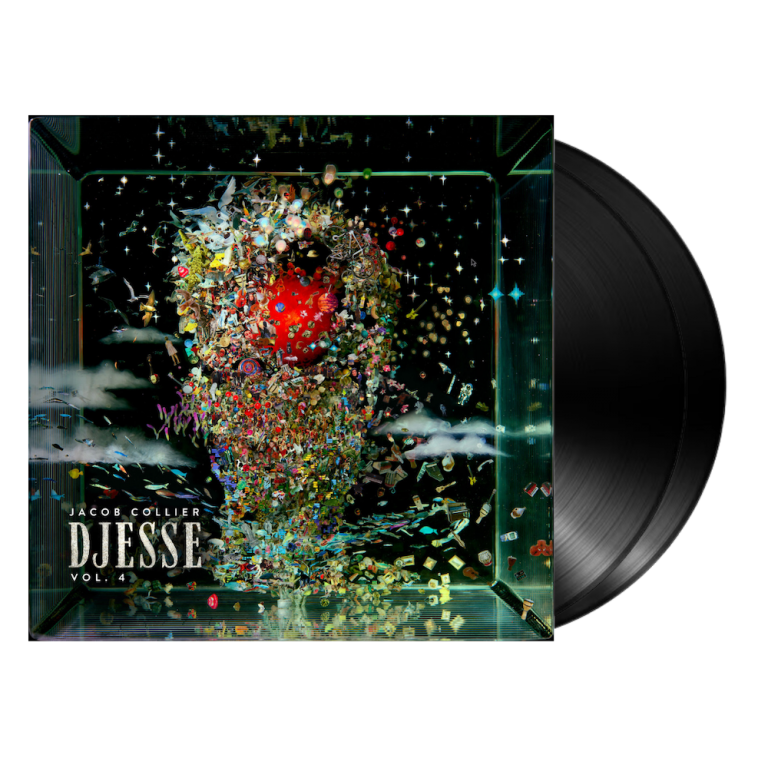Inspired visionary or annoying show-off? Jacob Collier – singer, composer, educator, producer, arranger, videographer, collaborator, experimentalist, multi-instrumentalist, choir director, three-time Grammy winner and former child actor – is one of our most prolific multihyphenates. His self-described “creative infinity syndrome” means that ideas constantly whirl and percolate around him, hitting their targets in ways that are ambitious, audacious and often astonishing.
At 30-years-old, with his current fifth studio album, “Djesse Vol. 4,” released in the magical interstices between midnight on 29 February and 1am on 1 March, the avowed “questor of delicion and nutrition” has tied the bow on a long-term project: a four volume, 50-song, genre-leaping album featuring over two dozen artists and ensembles. An enterprise so bold and fearless, so distinct and far-reaching, that it flirted with hubris. With heights so stratospheric that he almost flew, Icarus-like, too close to the sun.

JACOB COLLIER Djesse Vol. 4
Available to purchase from our US store.Is Collier the jazz messiah, as many believe? Or just, well, a very naughty boy?
One thing he is, is polarising. So much so that Urban Dictionary, the online platform for slang words and phrases, lists 2 very contradictory Jacob Collier entries, and Reddit, the online debating forum, is pulsing with opposing viewpoints.
Collier is a master of harmonisation, chords and microtones, and he has perfect pitch. Are you kidding? He’s a brazen show-off who didn’t just invent a continually modulating musical scale but named it, pretentiously, the Super-Ultra-Hyper-Mega-Meta-Lydian. Perhaps not everyone realises he’s having a lot of fun with his music theory geek outs. The eldest of three children raised by a violinist single mother in a north London home with a music room (in which the family would sing Bach chorales), Collier seems not to care a jot what people think, as long as he can keep on throwing paint to see what sticks. After all, as his early split screen videos testify, this is an artist given to wearing yellow Crocs and furry trapper hats with cat’s ears.
It helps that Collier came bolstered by cred from on high, almost from the get-go. His 2013 breakthrough YouTube video, a cover of Stevie Wonder’s “Don’t You Worry ‘Bout a Thing” that saw him singing a six-part harmony and playing guitar, keys, percussion and double bass, got Quincy Jones double taking. He was flown to Montreux Jazz Festival, where he met Herbie Hancock (whom he later supported live), then co-developed musical hardware and software for live performance – including a vocal harmonizer that let him perform multi-voice harmonies in real time – with a boffin at MIT Media Lab.
Collier recorded “In My Room,” his 2016 debut album, in the family home, multitasking like a boss. He pre-released a Patreon-gathered series of 15-second video clips of melodies from 130 contributors including Jamie Cullum, Ben Folds and Herbie Hancock (who has compared Collier to Stravinsky), which he harmonised with multiple vocal parts with his multi-screen layout before uploading the results to social media. There was a world tour, mass adulation – what’s not to love (you’d think) about 100,000 voices singing multi-part harmonies to Elvis Presley’s “Can’t Help Falling in Love” as directed by a spot-lit, spindly-limbed artist – and loneliness, he’s said, from being on his own too long.
Then came the quadruple album project, the epic musical journey, that is “Djesse” (a riff on Collier’s initials). The result of hundreds of performances and dozens of collaborations with collaborators (Stormzy, the Metropole Orkest, Moroccan musician Hamid El Kasri) chosen because Collier wanted to learn from them, “Djesse” is a bravura exercise in talent, imagination and genre-melding.
“Djesse Vol.4” is its zenith. A summation of Collier’s remarkable creative process. A whole greater than the sum of its parts, though its parts are many and varied. John Legend and Tori Kelly are there on “Bridge Over Troubled Water,” as is country singer Yebba (who requested to be uncredited, which sent Reddit rumours into overdrive). “Little Blue” features Brandi Carlisle. Colombian music star Camilo guests on the oh-so-catchy “Mi Corazón.” Other collaborator/titans include Chris Martin, John Mayer, Anoushka Shankar
Willow Smith is there in the anthemic (then furiously alt-metal) “100,000 Voices,” an opener that grabs you by the scruff and holds on. “Let me be happy/ Let me be ordinary,” sings Collier in his superb four-octave voice, buoyed by that massed voice audience choir. He seems, already, the former, a happy guy revelling in what music can do, overjoyed at doing it, and having the time of his life.
But ordinary? Hardly. Let the quarrels continue: Jacob Collier has only just begun.
Jane Cornwell is an Australian-born, London-based writer on arts, travel and music for publications and platforms in the UK and Australia, including Songlines and Jazzwise. She’s the former jazz critic of the London Evening Standard.
Header image: Jacob Collier. Photo: Thom Kerr.


